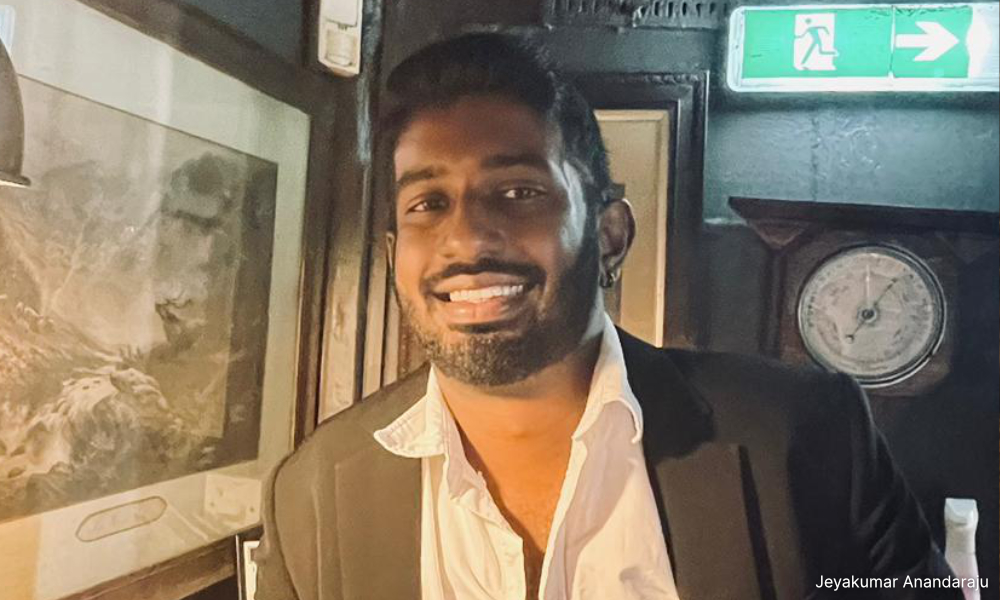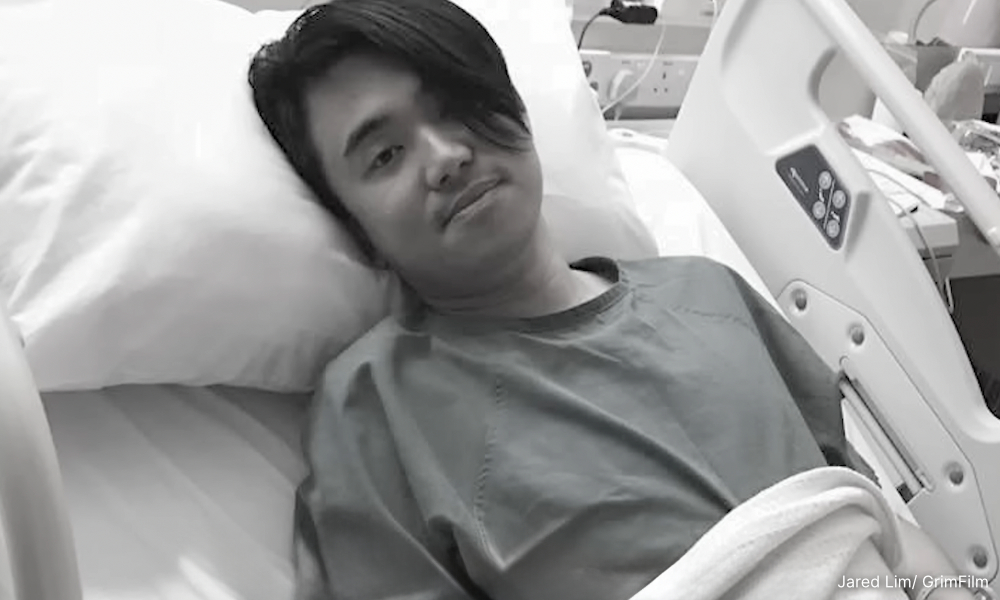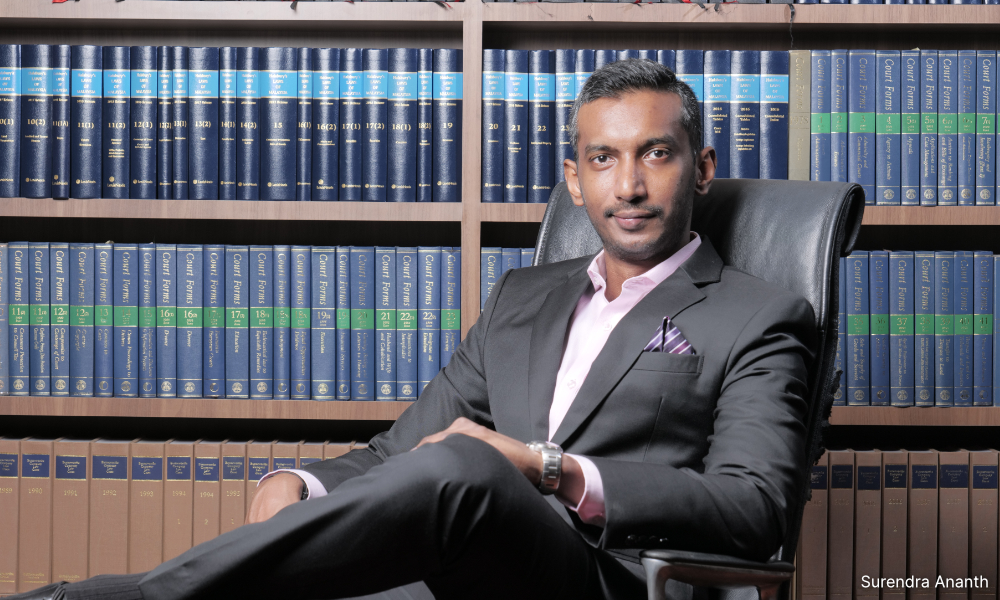When lawyer Surendra Ananth went for a check-up after experiencing pain in his lower back and below his stomach in March 2023, he never thought it would lead to a testicular cancer diagnosis.
“I thought it was a stomach issue so I went to see a gastroenterologist. The pain was on and off for three months and the doctor was doing everything but could not find the cause.
In July 2023, he experienced a sharp pain in his testicle and sought treatment.
An ultrasound was done and the doctors found a lump in his testicle that proved cancerous. Unfortunately, the cancer had also spread and his stomach and lower back pain was due to it spreading to the lymph nodes in those areas.
Surendra (above), 34, lamented that if he had done self-inspections which most men should be doing every month or twice a month, he would have noticed the lump early on and probably identified the cancer at stage one.
Because it has spread (metastasized) he was diagnosed with stage three cancer.
According to the National Cancer Society Malaysia, testicular cancer is the 18th most common cancer for males of all ages in Malaysia. However, for males aged 15 to 24, testicular cancer is notably the third most common cancer.
Lightning strikes twice
The family was dealt another blow when Surendra’s younger brother Jeyakumar Anandaraju was diagnosed with the same form of cancer just a few months later.
Jeyakumar, 28, was a human resources executive in the UK who came back to Malaysia in November 2023. He was supposed to start working at his new job here but that got postponed.
“I came back to be with family because my brother was going through his cancer treatment and I also got diagnosed with testicular cancer,“ Jeyakumar said.
When his brother Surendra was diagnosed, Jeyakumar was still working in the UK. His father called and told him the news and also told him to self-check.

“So, every time I’m in the shower, like once a week, I will check. I don’t know whether it’s a coincidence or not, but when I got back to Malaysia, I noticed a swelling in one of my testicles,” he recalled.
It did not hurt but one side felt harder than the other. Considering what his brother had gone through, he did not take any chances.
He went to get himself tested and a cancer screening showed that his cancer was in its early stages.
Jeyakumar had read online that the swelling could be symptoms of early stages of cancer or nothing at all.
So he went to the same hospital and met the same urologist as his brother. An ultrasound was done and it showed a tumour.
“Then I did a blood test. My blood test was all fine. The tumour markers were not raised but the urologist said that in early stages they won’t show on your blood test,” he said.
However, the urologist was a bit worried about the tumour detected by the ultrasound and suggested a spot biopsy where they take out a bit of the tumour and run tests to see if it is cancerous.
The sample tested positive for cancer and an operation was performed to remove his left testicle.
“Initially I was in shock because I was only 27 and never had any underlying health issues. I didn’t feel any pain. I was fit. Why me? After a day or two I just accepted it,” he said.
Because his cancer was caught early, he only needed to undergo surgery to remove the testicle and one cycle of chemotherapy on Jan 23, this year. The chemotherapy was to reduce the chances of cancer recurrence.
Sharing the experience on YouTube
One of the best-known local personalities who shared his experience undergoing treatment for testicular cancer with the world was Jared Lee, 39, a filmmaker with his own YouTube page and filmmaking company The Grim Film.

Short films of his experience are available on The Grim Film’s YouTube page.
“I was first diagnosed with testicular cancer back in 2018. It was at stage one,” Lee shared.
It all started with what he described as a tugging sensation above his groin area. So he got himself checked out by a doctor.
Lee’s biological father, uncle, and grandfather were diagnosed with cancer but none of them had testicular cancer.
A lot of things went through his mind when he was told he had testicular cancer. The way cancer is often portrayed by the media and how surgery does not promise a 100 percent survival rate affected him.
“At that time, my film career was just picking up. My first regret was being unable to see my unmade ideas on screen. I told my wife to make sure these ideas get made by different director friends,” Lee explained.
A big fan of The Avengers movie series, he also had to brace himself for the possibility of never knowing how the superheroes were going to beat the villainous Thanos.
He was also wary about breaking the news to his family.

“Knowing how emotional my mom is, I decided to go through the whole treatment before revealing the news to her. Before the surgery, I had dinner with my best friend, brother, and wife,” said Lee, recalling those traumatic moments.
“I had to remove my left testicle, subsequently CT (computed tomography scan), and then chemotherapy. I have yet to be declared cancer-free, I have one more final check-up to go,” he said during the interview.
Two years ago, he found out that he couldn’t father any children and that news devastated him and his wife. The doctor said it was due to his cancer.
Despite this setback, he has a new perspective on life.
“Knowing that it may all have ended for me has made me appreciate people around me. I now pursue filmmaking projects harder than I did before,” Lee said.
He advises everyone to undergo an annual full body check-up.
“While not knowing may give you peace of mind, bear in mind that there are so many medical conditions we can avoid if we regularly go for check-ups and catch things early.”
He hopes to change mindsets by sharing his experience. He has personally replied to boys and men who were too shy to talk about testicular cancer with family members.
On occasion, he has to put up with people making jokes about his one testicle.
“I made jokes about it as well to lighten the mood when we dive into the conversation and it gets too heavy,” Lee said.
He said a support group just for testicular cancer patients and survivors would be great as it would provide a comfortable avenue to share experiences and seek help.
Forming a support group
Surendra feels that men don’t like to talk about this particular form of cancer because of the body part involved.
“Perhaps it is because the moment you are diagnosed with testicular cancer, the first thing you have to do is remove one testicle.
“There is also the misguided perception that because it’s testicles, it could be associated with lifestyle. In reality, it has nothing to do with lifestyle,” Surendra explained.
He noticed that there are no local support groups for men with testicular cancer. The ones that can be found online are based in the US or Europe, with members mostly from that part of the world.

Vital information such as where to find a testicular cancer expert or oncologist, and where to undergo surgery, is not readily available for those living in Malaysia.
“I had to go and ask around and I was lucky because as a lawyer I’m well connected and know several people. I only had to ask and they all gave me the information. So I just didn’t want anyone to have to go through that,” Surendra explained.
He has gotten in touch with the Testicular Cancer Awareness Foundation registered in the US. There are plans to modify their brochures for Malaysia and start distributing them in hospitals and universities here.
Surendra also plans to create a website that helps those who have this form of cancer find the nearest specialist who can treat them. All the information they need will be right there at their fingertips.



No comments:
Post a Comment
Note: Only a member of this blog may post a comment.